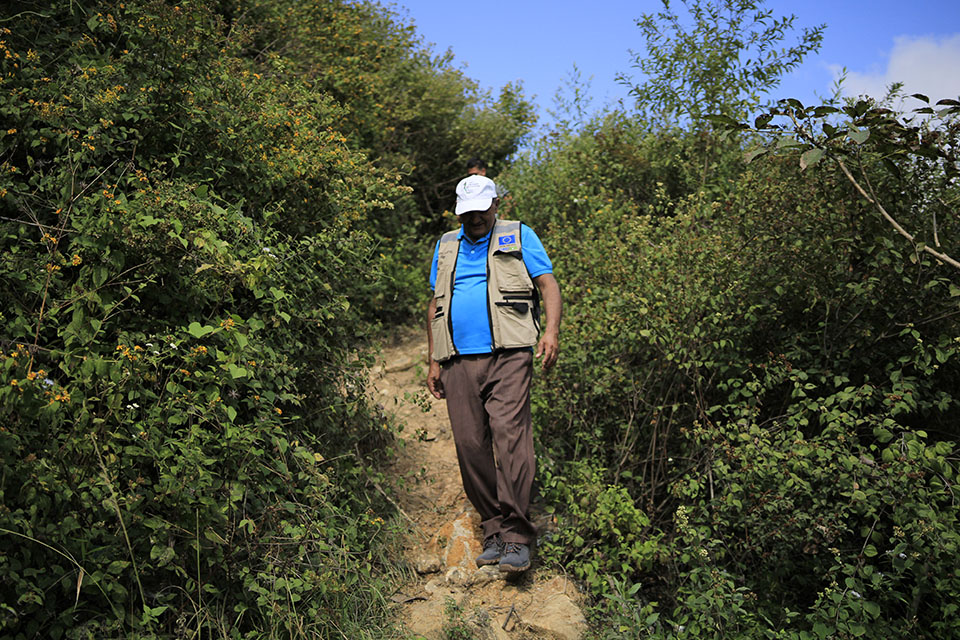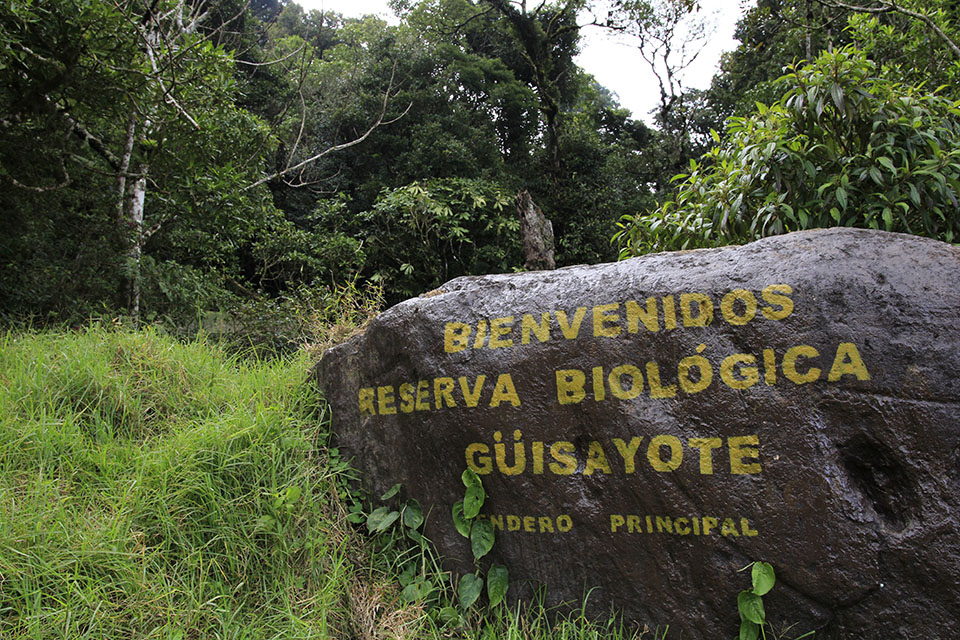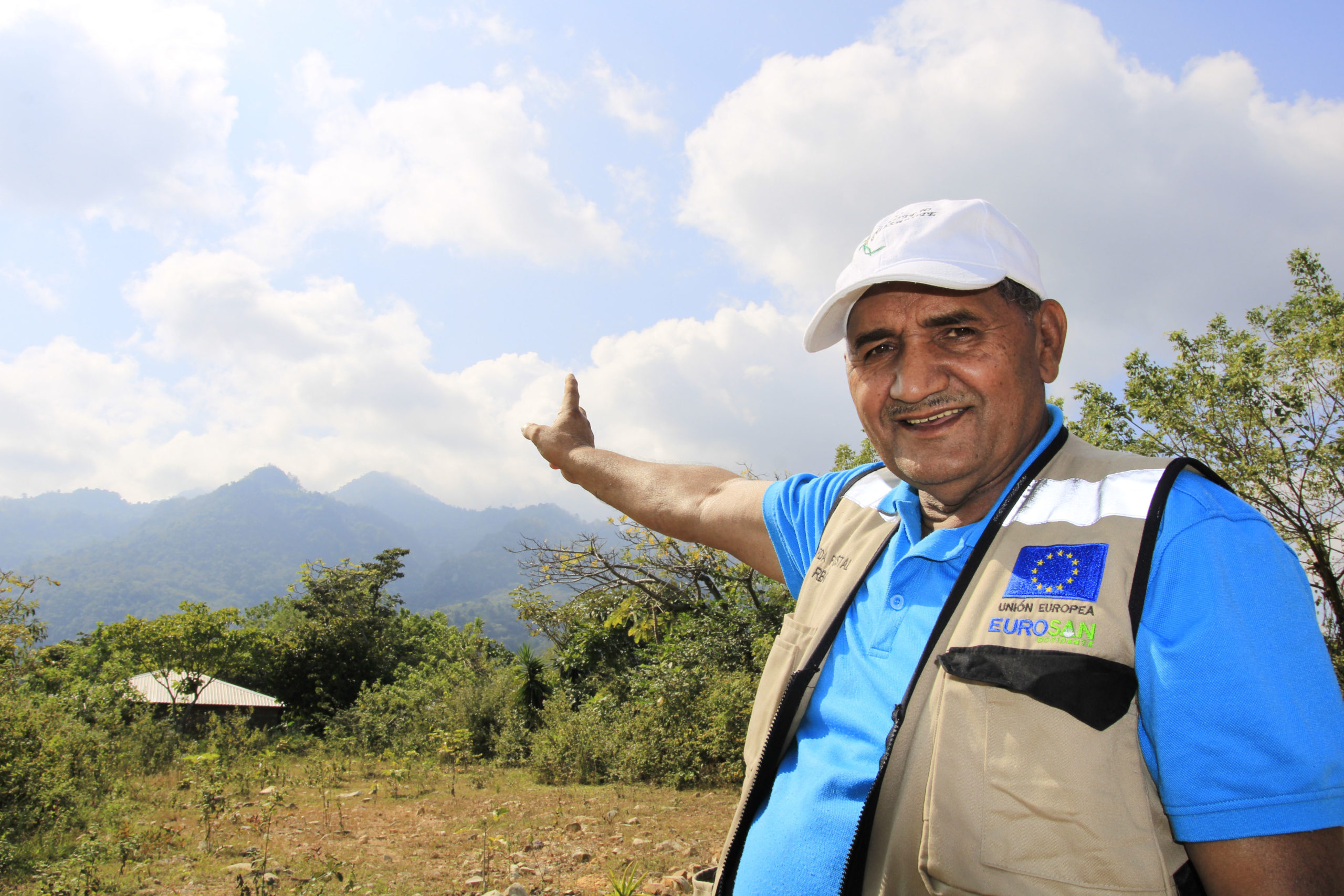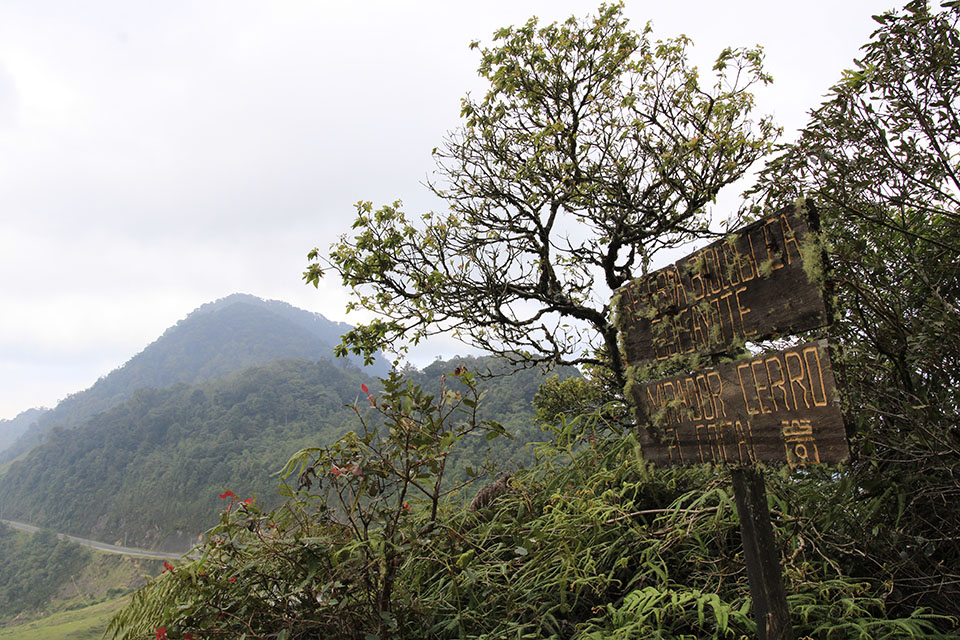Pedro Pinto, 67, has spent over half his life defending the environment in the western region of Ocotepeque, Honduras. In November 2022, two of his vehicles were burned by an unknown party, he suspects that they were enemies of his work as an environmental defender. In Honduras, protecting the environment is a deadly risk; between 2002 and 2014, 111 environmentalists were killed in the country.
This article was translated in collaboration with the Latin American Bureau (LAB), an online and in-print publisher and web platform dedicated to amplifying independent journalism from Latin America.
Text: Allan Bu
Photos: Amílcar Izaguirre
Translated by: Aron O’Shea from LAB
Back in 1979, when Pedro Pinto began conversations about defending the country’s natural resources, Honduras was still under a military regime. More than 40 years have passed since then, but Don Pedro (who has now earned the respected title of ‘don’) continues to defend the water, woodlands, and the mountain of the Güisayote Nature Reserve in La Labor, a municipality in the department of Ocotepeque, located on the country’s western border with Guatemala and El Salvador.
Don Pinto has spent over four decades in one of the most dangerous jobs in Honduras: defending the environment. According to a report released by the NGO Global Witness, 111 environmental activists were killed in the country between 2002 and 2014. The report’s timeline does not include the high-profile deaths of Jeannette Kawas, Carlos Escaleras, and most recently, Berta Cáceres. Despite the decision of the Honduran Supreme Court to sentence seven people for Cáceres’ murder (with sentences ranging from 30 to 50 years), her family is still calling for the masterminds behind the assassination to be brought to justice.
Don Pedro has also received death threats but continues to fight. In November 2022, he was targeted when an unknown party set two of his vehicles alight. One of his sons was hit by an unknown vehicle whilst riding his motorcycle. Don Pedro does not dismiss the possibility that the latter event could be Honduras: defending a mountain for 30 years related to threats against him. Some years ago, his coffee plantation was destroyed, causing him to make a loss.
Don Pedro remembers when the mountain in Güisayote was declared a nature reserve on 5 August 1987 under Legislative Decree No. 87-87. ‘That’s when I started defending the mountain and sowing trees in the area,’ he said. ‘It’s from there that we in La Labor get our water,’ the 67-year-old, who mentioned having met Berta Cáceres in many workshops, explained.
Since March 2022, Don Pedro has been an employee of the Instituto Nacional de Conservación Forestal (ICF – National Institute for Forestry Conservation). When asked how the Honduran State helped him in his efforts as an environmental defender, his honest response was that ‘up until now they’ve employed me as a technician in the ICF. Before that, I went on courses and received training, but that was through NGOs; the State does very little.’
Don Pedro is a man who does not mince his words. He grows beans and corn and still has the energy of a younger man. He also owns a plantation that produces coffee, bananas, and plantains. In the municipality of La Labor, located around 40 minutes away from the departmental capital, Ocotepeque, the environmentalist has accrued decades of experience being involved in the organization and running of the water boards that oversee the municipal water supply. For many years, he also coordinated and organized the Güisayote Defence Committee.
La Labor is a picturesque town with steep roads and shops that have flourished in recent years. In the municipality, you can find restaurants, hotels, and coffee-producing cooperatives. It is located just on the edge of the CA-4 motorway which connects Ocotepeque with San Pedro Sula. According to legend, it derives its name from the industrious nature of its first residents. Today, it is made up of eight villages and 44 hamlets. In October, the municipality holds the Corn Festival, where you can taste delicious dishes made from corn. In the same month, they also hold a parade in which they decorate floats with corn husks and other local items.
The Mayor of La Labor, Lenín Villeda (a member of the Honduran Partido Nacional) explained that where he lives, Don Pedro is the head of the water board and has been re-elected many times. ‘He’s a very noble person and is well suited to environmental conservation. He’s the president of the water board in my neighborhood and has been for 12 years. The people vote for him, he’s not a dictator, I’ve been in the meetings, and the people do vote for him.’
Don Pedro has gone much further than just presiding over the water board, he was at the front of the fight against a new mine by the Canadian-owned company Maverick, which under Ricardo Maduro’s government (2002-2006) received a license to work 1,000 hectares of protected land within Güisayote. The inhabitants of La Labor and Santa Lucía first tried to stop the mine through legal action and later through the media pressure, but neither the government nor the mining company backed down, continuing with their plans to exploit the forest. Don Pedro also recalls that, at the time, a journalist empathetic to his cause in Santa Rosa de Copán was murdered.
Almost two years had passed since Maverick was awarded the license before they brought in heavy machinery to mine the land. Days later, an advertisement for 200 workers appeared; they were to immediately start work. Then, on 14 April 2004, hundreds of Ocotepeque’s residents occupied the CA4 motorway to demand that Congress revoke the license. ‘You’ve reminded me that April 14 is a day of dignity. We took the motorway on that day for 52 hours until the Government reversed its decision,’ Don Pedro recalls.
In reality, however, the Government only limited the license instead of revoking it. After that, the mining company was no longer interested in working the land and even posted announcements online to sell off the land it had obtained in Ocotepeque. ‘Maybe nobody was interested,’ Don Pedro said since there has never been a working mine in La Labor.
During the first term of Juan Orlando Hernández’s premiership (2014-2018), the inhabitants of La Labor and one of the municipality’s villages, Santa Lucía, occupied the motorway yet again, this time in response to the planned change of Güisayote’s protected status. Following an initiative by Representative Román Villeda (who in 2018 was accused of abuse of authority, falsification of documents and crimes against the State), the National Congress decided to change the status of Güisayote from that of a nature reserve to that of a national park. ‘They had even added that commercial activities could take place on the mountain,’ Don Pedro remarked. One day of protests, however, was enough to make them reconsider targeting Güisayote.
Mayor Lenín Villeda told Contracorriente that Don Pedro’s fight has resulted in dangerous consequences for him and his family, as his defense of the environment has come up against opposition. ‘They’ve gone as far as to hire assassins to kill him, I think Don Pedro should take great care going forward,’ Villeda cautioned.
‘Going as far as to hire assassins to kill him, Don Pedro should tread carefully’ Lenín Villeda, Mayor of La Labor
Threats and instability
The Mayor’s fears are grounded in that two of Pedro Pinto’s vehicles were set ablaze, one near his home and the other at his plantation; while the workers harvested the coffee, the flames engulfed the vehicle. The environmentalist recounted that ‘November [2022] was the trickiest month of all for my family. I’m used to these types of situations, but my wife was terrified. When they burned the second vehicle, I was in Tegucigalpa, but she was with the plantation workers and has been frightened ever since.’
This was not the first time Don Pedro’s property had been targeted. ‘Around seven years ago, during Juan Orlando Hernández’s first term in office, they came and cut down my coffee plants, due to my defense of the forest.’ Don Pedro later mentioned that he thinks these latest incidents were not done due to his activities in Güisayote but due to his work defending the so-called ‘Municipal Lumberyard’. The ‘lumberyard’ is a plot of land owned by the Municipality of about 2,000 hectares in size that produces wood for its residents, however, there are those who would like to profit illegally from its wood supply.
The land was purchased in 1912 with funds from the Catholic Church, whose objective was for the inhabitants to use the plot to raise livestock and produce wood. Initially, the plot comprised 4,000 hectares, but now half of the land goes unused; that is where some people are looking to exploit the land, Don Pedro revealed. This problem is common in Honduras, which data from the ICF confirms. Between 2019 and 2020, approximately 200,000 hectares were affected by illegal logging and deforestation
Don Pedro mentioned that another incident had caused him problems: the Fuerza de Tarea Interinstitucional Ambiental (FTIA – Interdepartmental Environment Taskforce) detained two lorries full of wood that had no license, which were suspected to belong to an ex-congressman. Don Pedro’s work as a technician for the ICF has also seen the rejection of a permit for a new road that would have affected the pine forests. ‘My job is to carry out inspections. I’m not the one who determines whether or not permits are given out, but I feel like my work has bothered some people,’ he said.
In March 2022, Don Pedro was hired as a technician by the ICF. He assures us that he has National Police officers at his disposal to carry out investigations or to put a stop to any illegal activities where the environment is concerned. Although, his main role is documenting the exploitation of resources so that the institute can determine whether or not the law has been breached.
However, since becoming a state employee he has been targeted even more. In December 2022, while discussing the burned vehicles, the environmental defender told Contracorriente that his ICF colleagues had suggested that he should not leave his home too often and that take precautionary measures. At the time, he explains, he had considered seeking asylum in another Central American country, but ‘we’re going to face the situation because we can’t go on like this.’
Around the time in December when he was waiting for a response from the Government, Don Pedro told Contracorriente: ‘The damages are being caused because I stand up to those who want to harm the forest’, so ‘the State should respond, as I work for the Government.’ He added that the regional authorities of the ICF had helped him, although not sufficiently, having not been assigned either personal security or security for his home. In a later conversation, Don Pedro confirmed to us that in February 2023, almost three months after the burning of his vehicles, he had been assigned a police detail to accompany him while he worked.
Don Pedro recounted that he was granted the security detail thanks to the intervention of the Comité de Familiares de Detenidos Desaparecidos en Honduras (COFADEH – the Committee of Relatives of the Disappeared in Honduras), who negotiated the assignment of security. Despite the presence of the security detail, the land defender is still vulnerable. Don Pedro is covered by the National Protection Mechanism: after having gone before a judge on 13 April to report his situation, the land defender received a statement from the Inter-American Court of Human Rights (Corte Interamericana de Derechos Humanos), which called upon the Honduran Government to protect Don Pedro’s life and that of his family. Don Pedro said that he had also appeared before the Public Prosecutor’s Office against those accused, but in the end, the case was dismissed by the judge.
The lack of security for the environmentalist despite the threats against him is not unusual. La Labor Mayor, Lenín Villeda, clarified that they only have one ICF technician in the department of Ocotepeque. In order to register an environmental complaint you would have to go to Santa Rosa de Copán, located 68 km away from the departmental headquarters in Ocotepeque. There is no public prosecutor for the environment in the department because of restructuring under the second government of Juan Orlando Hernández.
The Mountain
The mountain that Pedro Pinto has protected since the late 1980s forms a part of the Güisayote Nature Reserve, whose name is derived from a type of pumpkin. The mountain is home to a variety of ecosystems, flora, and fauna. In Ocotepeque, they say that güisayote in the indigenous language means an ‘abundance of food’.
A protected area, the reserve is the source of some 40 streams that combine to form nine rivers, five of which flow into the Atlantic Ocean, with the other four joining the Pacific. The mountain is also home to the source of the river Higuito, which joins the fast-flowing Ulúa River in Santa Bárbara.
The Güisayote Reserve covers 14,081 hectares, with 4,592 of these forming its center and the other 9,489 hectares creating a buffer zone. It is located within the jurisdiction of the municipalities of La Labor, San Francisco del Valle, San Marcos, Mercedes, Sinuapa, and Fraternidad. It belongs to the Merendón mountain range. Ocotepeque is also home to the El Pital and Volcán Pacayita Nature Reserves, the latter shared with the neighboring department of Lempira as well as with Montecristo Trifinio National Park, a tripartite protected area shared by Honduras, El Salvador, and Guatemala.
In Honduras, these reserves come under the 91 areas protected by the ICF, which include national parks, wildlife sanctuaries, and nature reserves. Despite their protected status, many of these areas have been and continue to be under threat. Such is the case for Carlos Escaleras National Park, where nearby residents are fighting against Inversiones Los Pinares, which extracts iron oxide from the center of the park. Another protected zone facing its destruction is Cuyamel Omoa Park.
In La Labor, Ocotepeque, the citizens involved in defending the environment such as its mayor and advisors from the Asociación Ecológica de San Marcos (AESMO – Ecological Association of San Marcos) have taken the initiative to buy more than a thousand hectares of land in the buffer zone of Güisayote, where the municipality’s water sources are located. Villeda clarified that it is not just a municipal effort and that apart from the mayoral funds used, other contributors to the effort include the water boards, restaurants, hotels, cooperatives, and other businesses. The mayor explained that despite its protected area status, some people own ancestral plots and use them as farmland, so ‘buying the land is a way of stopping it from being used for agriculture.’
Villeda stated that the AESMO had been a crucial member of the project since they were the ones who ran the studies and who negotiated the purchases to avoid fraud. ‘They filled in the documents on behalf of all of us, you’ll find the Municipality, the water boards, and private businesses all listed there, but nobody can sell their plot – it’s only to save the forest,’ he clarified. ‘The model has been very effective and the water boards have committed to buying plots where water sources are found, that way we can prevent the land from being used in shifting cultivation.’
The model used in La Labor for protecting natural resources is being replicated in other municipalities in Ocotepeque such as San Marcos, San Francisco del Valle, Sinuapa, Lucerna, and some in the south of the Lempira department. It is no coincidence that the first municipality to develop such a method for protecting its water sources was La Labor, where Pedro Pinto has spent more than 40 years defending the environment.
‘I’ve been running the municipal water systems for years and we’ve noticed that the water is running dry in some small villages,’ Don Pedro explained. However, he maintained that La Labor does not suffer water shortages because they purchased 100 hectares of land some years ago to protect the watershed. At that altitude, there are about 2,000 hectares dedicated to only producing water. ‘They’re untouchable,’ he muttered, as he crossed himself.
However, in Honduras, there are always battles to fight for people like Don Pedro. He is currently organizing the defense of one of the municipality’s micro-watersheds after a judge, abusing his authority, granted 10 inches of water (a measurement for pressure) to a processing plant, when according to the law such decisions rest solely within the purview of municipalities.
In this country of good people, which is nevertheless drowning in poverty and violence, being an environmental defender is an enormous risk. Doing so in Ocotepeque, a department long forgotten by politicians, could pose an even greater risk. We asked Don Pedro if he felt alone after so many years of fighting. ‘Sometimes, but I’ve never been doubtful because this is a piece of heritage that should be seen as a necessity,’ he attested, while the Güisayote Reserve stood imposingly like a green giant over his shoulder.
‘The effort has been worth it, now we’ve got beautiful areas like Güisayote,’ he told us in December 2022, just after the threats against him. In April, we got back in touch with Don Pedro and he was still receiving threats, nevertheless, he continued defending the mountain. Towards the end of the phone call with Don Pedro, he explained that he was going to fight a fire set by a pyromaniac in the center of the reserve, ‘after I’ve finished talking to you, I’ll go,’ he said.
This collaboration with LAB is part of their Environmental Defenders Series, which highlights the achievements and anger of those defending their right to land, water, and their way of life in the region.









